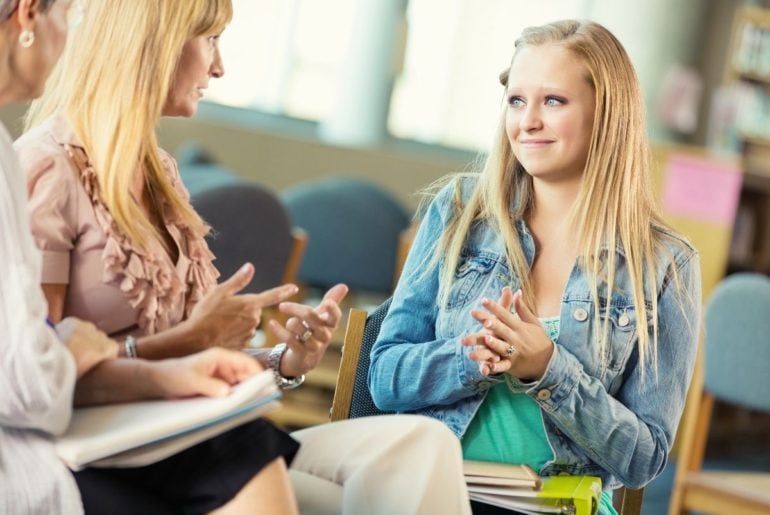This year has thrown us all for a loop, and children are no exception. Between last spring’s abrupt school closings, the switch to distance learning, the social isolation that a quarantine commanded, and the uncertainty surrounding the new school year, it’s no wonder that many experts are sounding the alarm when it comes to our children’s mental health.
As children return to school this fall, whether virtually or in-person, many are dealing with a slew of potential stressors and in many cases, their schools lack the resources to help them. In fact, across all schools, the average student-to-school-counselor ratio is a whopping 464 to 1, according to the American School Counselor Association, and that’s if your child’s school even has a counselor on staff. Nearly 1 in 5 students — about 8 million — don’t have access to a school counselor at all, with nearly 3 million of those students also lacking access to school psychologists, social workers, or any other type of support staff.
Causing even more concern is a new study that suggests the pandemic is likely to undo months of academic gains, leaving many students behind. The researchers predict that many students will experience substantial drops in reading and math, specifically, losing roughly three months’ worth of gains in reading and five months’ worth of gains in math. This means lots of children will start off the new year struggling more than usual. That’s not the usual summer learning loss, that’s pandemic-level learning loss.
Even for those children who don’t fall too far behind academically, many are still dealing with other stressors, from the economic consequences of a family member’s job loss due to the pandemic to the emotional toll of losing a grandparent to coronavirus. All of this can have an enormous impact on a child’s well-being, and historically, schools have been “the de facto mental health system for many children and adolescents,” as the authors of one recent JAMA Pediatrics study said. The study found that schools actually provide mental health services to 57 percent of adolescents who need care. Children from lower-income families are even more likely to receive mental health services exclusively from schools.
Having access to mental health support at school can have an enormous impact on a child’s future. Research shows that high-poverty schools with student-to-school-counselor ratios that meet the ASCA’s recommendation tend to lead to better academic outcomes for students, including improved attendance, fewer disciplinary actions, and higher graduation rates. Black students are also more likely than their white peers to identify their school’s counselor as the person with the most influence on whether they should go to college.
Given that so many mental health disorders begin in childhood, it’s important that any issues be identified and treated as early as possible, and having access to a school counselor can make a huge difference.
What Parents Can Do
One way to help ease the stress of returning to school in the middle of a pandemic for your child is to encourage teacher check-ins, and participate in some yourself, even if your child is distance learning. Sharing a little bit about your kiddo can help teachers get to know your child better, perhaps making it easier for them to identify and when your child seems in need of any extra support. Ensuring your child has some one-on-one with their teacher also goes a long way. Even a biweekly virtual check-in is better than nothing if your child is distance learning. Encourage them to request the time from their teacher, or mention it to them yourself during your parent-teacher check-in. If she or he notices a change in your student’s behavior or progress, perhaps they can help them connect with their school’s counselor or other mental health services available within your school district.
It’s also a good idea to keep an eye on their grades, sleep, and moods, especially now. A sudden drop in grades can be a sign they may be falling behind but too embarrassed or scared to ask for help. A lack of sleep can affect mood, which in turn impacts their attitude towards school and their ability to concentrate. Keeping an eye on these types of things can make a huge difference.
Parents can also check to see if the requirement for the number of school counselors is being met at their child’s school, and they can push for change if it isn’t. Even if you’ve never been involved in your school’s Parent-Teacher Association, this may be the year to do it. Many PTAs now meet virtually or have ongoing social media threads where parents can pose questions or concerns. If your school could benefit from having more school counselors available to students, perhaps you can suggest leveraging funding from something else given the unprecedented nature of the pandemic. Many of these types of systemic changes often begin as basic conversations during these types of simple gatherings, so don’t be afraid to ask questions, even if your school doesn’t have all the answers yet.
As the school year kicks off and kids dive into these new routines, ensuring each child has access to sufficient counseling, whether they’re learning in-person or virtually, can have a huge impact on their overall health.







